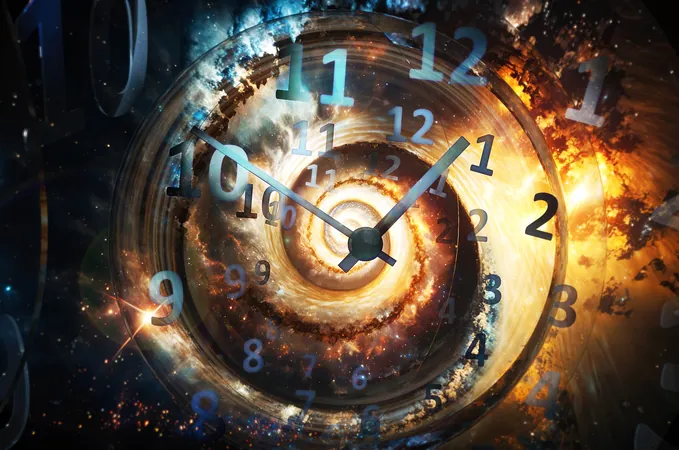
Is Time Just an Illusion? Physicists Challenging Traditional Concepts
2025-01-11
Author: Ming
The Illusion of Time in Everyday Life
Though we structure our daily lives around the concepts of past, present, and future—paying bills, setting alarms—physicists argue that the equations governing the universe do not specify which moment is 'now.' This alarming notion illustrates a clash between our intuitive understanding and the abstract principles of physics.
Prominent among those advocating a different understanding of time is Dr. Carlo Rovelli, a theoretical physicist known for his work in loop quantum gravity. Dr. Rovelli's theories suggest that the notion of a universal time parameter is unnecessary, a stance that is reshaping current scientific discourse.
Intuition vs. Physics
Our instincts tell us that the present moment is distinct, while the future remains uncertain and the past is fixed. However, according to Einstein's theories, all moments—past, present, and future—could coexist equally, negating any universal 'now.'
Moreover, the effects of gravity influence time: clocks run slower at sea level compared to those at higher altitudes. This relativity means that time is not experienced uniformly; depending on your location and speed, you may perceive time differently. Such phenomena have been extensively verified using atomic clocks, illustrating that time cannot be treated as a consistent backdrop.
The Flow of Time: A Complex Perspective
Many physicists argue that our perception of a 'flow of time' may be constructed by our brains, layering a sense of motion over a fundamentally static reality. Some theorists contend that what we perceive as time progression stems from correlations among different physical entities rather than an intrinsic characteristic of the universe.
Discoveries in Relativity
Albert Einstein significantly reshaped our understanding of time through his theories of relativity. The special theory of relativity demonstrated that time is relative to the observer, meaning that travelers at high speeds or near massive objects will experience time differently.
Experiments, such as those involving fast-moving particles and GPS satellites, have confirmed the concept of 'time dilation,' where time can stretch and compress based on gravitational fields and speed.
The Quantum Complexity of Time
Quantum mechanics further complicates our understanding. Traditional models view time as a steady sequence, yet quantum experiments suggest that no single observer can define a universal 'now.' Equations like the Wheeler-DeWitt equation challenge the notion of time, instead focusing on relationships between various segments of the universe, implying that time is something that emerges only through interaction with observers.
The Entropic Arrow of Time
Despite the theoretical doubts about time’s existence, we experience an undeniable directionality to time, commonly referred to as the "arrow of time." This concept is closely tied to entropy—the measure of disorder—that naturally increases in the universe. According to the second law of thermodynamics, isolated systems move towards greater entropy, giving us a basis for understanding time's progression from past to future.
The Fundamental Nature of Time
Experts speculate that as our understanding of the universe evolves, we might come to regard time similarly to currency—a construct we've developed rather than a foundational aspect of existence. Regardless of whether time is real or an illusion, human life continues to unfold under the assumption that each moment matters.
As our hearts beat in seconds and our lives revolve around schedules, we grapple with the philosophical dilemma of time's reality. The question persists: Will humanity eventually grasp the true nature of time, or will we remain entangled in our current perceptions? Only time will reveal the answer.
Stay tuned for further insights as scientists continue to unravel the complexities of time!


 Brasil (PT)
Brasil (PT)
 Canada (EN)
Canada (EN)
 Chile (ES)
Chile (ES)
 Česko (CS)
Česko (CS)
 대한민국 (KO)
대한민국 (KO)
 España (ES)
España (ES)
 France (FR)
France (FR)
 Hong Kong (EN)
Hong Kong (EN)
 Italia (IT)
Italia (IT)
 日本 (JA)
日本 (JA)
 Magyarország (HU)
Magyarország (HU)
 Norge (NO)
Norge (NO)
 Polska (PL)
Polska (PL)
 Schweiz (DE)
Schweiz (DE)
 Singapore (EN)
Singapore (EN)
 Sverige (SV)
Sverige (SV)
 Suomi (FI)
Suomi (FI)
 Türkiye (TR)
Türkiye (TR)
 الإمارات العربية المتحدة (AR)
الإمارات العربية المتحدة (AR)